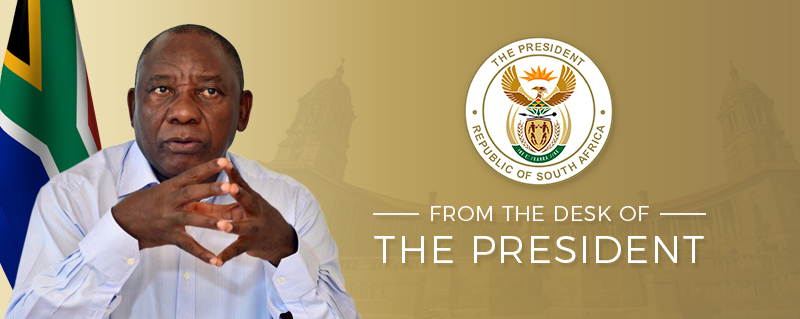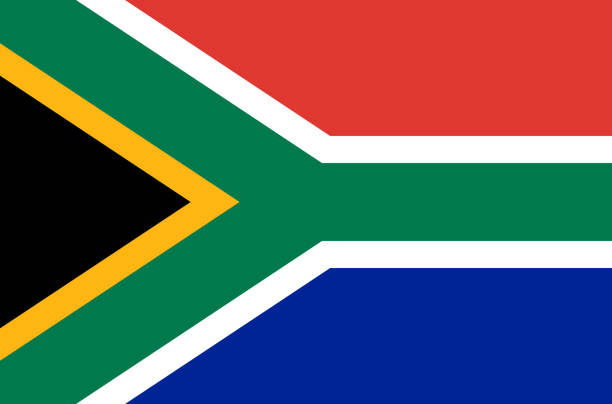
12 April 2021
Dear Fellow South African,
I have often said that our economic recovery plan is not about a return to what was, but about transformation to what is next.
We have to both recover the ground that we have lost due to the coronavirus pandemic, and to gain new ground by placing our economy on a fundamentally different growth trajectory.
In short, we have to use this moment to forge a new economy in a new global reality.
One of the concrete ways that we can do this is by harnessing the job creating potential of the digital economy, whose growth has only been accelerated by the coronavirus pandemic.
Last week, South Africa was ranked first in the world as a destination for global business services – often called business process outsourcing – in a survey of over 600 executives from eight key sourcing markets, including Australia, Canada, France, Germany, Italy, Spain, the UK and the USA.
This sector includes call centres, technical support and back and front office services for major multinationals and South African firms.
This is truly a remarkable achievement. In a short space of time, our country has propelled itself from a relatively unknown destination for offshore customer service delivery, in the shadow of large competitors such as India and the Philippines, to the very forefront of the global industry.
The story of how this was achieved holds important lessons for what we can do if we work relentlessly as government and social partners towards a common goal.
South Africa has several advantages that make it an attractive destination for business services.
First, we have sophisticated digital infrastructure, including mobile networks and high-speed broadband. Second, we have a young, dynamic and skilled workforce that delivers a world-renowned quality of service, along with deep knowledge in technology and financial services. Third, we have a high level of English proficiency. And finally, we are positioned in a similar time zone to our key export markets.
These unique attributes have provided us with a strong foundation to work from. However, last week’s achievement would not have been possible without the proactive efforts of government and the sector over several years.
Led by the Department of Trade, Industry and Competition, government has worked closely with Business Process Enabling South Africa, the industry association, to market our country as a destination for investment, embarking on roadshows and campaigns around the world to demonstrate our strengths and capabilities.
Government introduced the Global Business Services Incentive just over two years ago to encourage investment and support job creation in the sector. The incentive has been successful in reducing costs and attracting new investors to South Africa.
The Presidential Employment Stimulus, which we launched in October last year in response to the economic impact of the pandemic, supported the expansion of this incentive. The stimulus has enabled the creation of 8,000 new jobs in the industry during the last two quarters, most of which have gone to previously unemployed youth.
When the pandemic first arrived on our shores, government worked closely with the sector to ensure continuity. South African global business service providers were able to shift quickly to remote operations, with clear and sensible guidelines to ensure that call centres could continue to provide essential services.
This is a testament to what can be achieved through the pursuit of a deliberate, proactive strategy to support the growth of new sectors. It is also an example of how we can ensure that this growth is inclusive and sustainable.
One condition for accessing the incentive is that a proportion of new jobs must be sourced through inclusive hiring and must go to marginalised youth. The industry has committed to use SAYouth.mobi, a platform for young people to access a range of opportunities, as a tool to recruit young people into these jobs. The platform forms part of the Presidential Youth Employment Intervention.
The result of all these efforts is that the sector in South Africa has grown at twice the global growth rate for the sector since 2014 and three times faster than key competitors. It has added 40,000 jobs to the economy since 2018, with young people making up 82% of these new jobs and women comprising 65% of the workforce.
The sector generates R1.9 billion a year in export revenues and attracts significant capital investment. With global demand on the rise, and with a compelling and competitive proposition to global buyers and investors, the sector in South Africa is on track to achieve its target of 100,000 new jobs by the end of 2023 and 500,000 new jobs by the end of 2030.
As we forge ahead with our economic reconstruction and recovery, we must recognise and nurture green shoots such as this.
Our country has boundless economic potential, both in established sectors such as mining, manufacturing and agriculture as well as in new frontiers such as the digital and green economies.
We have proven that by actively searching for areas of opportunity, setting clear national goals, working collaboratively with industry associations and social partners, and putting the right conditions in place for growth, we can unlock new potential and create jobs for young people in particular.
Through the various initiatives that we are undertaking – including Operation Vulindlela, the Presidential Employment Stimulus, the investment drive and the finalisation of sector master plans – we will remove constraints on investment and stimulate employment creation at an accelerated pace.
Too often, we get caught up in our immediate challenges and lose sight of our true potential. Our country has all of the ingredients that we need for economic success. We only need to recognise these, and put them to use.
With best regards,




